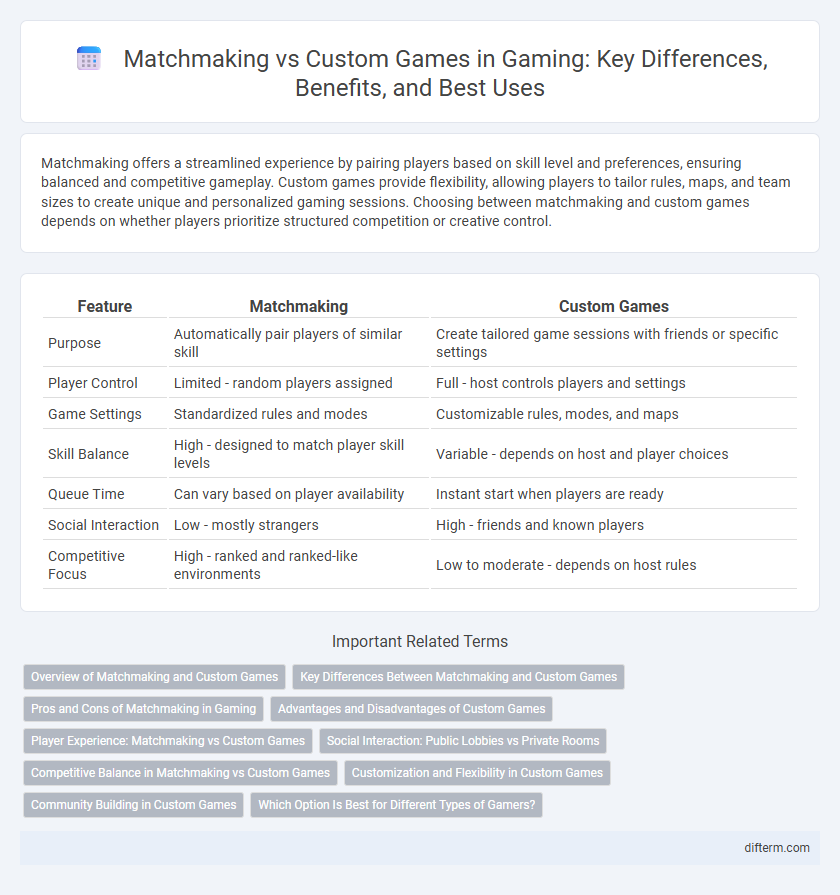Matchmaking offers a streamlined experience by pairing players based on skill level and preferences, ensuring balanced and competitive gameplay. Custom games provide flexibility, allowing players to tailor rules, maps, and team sizes to create unique and personalized gaming sessions. Choosing between matchmaking and custom games depends on whether players prioritize structured competition or creative control.
Table of Comparison
| Feature | Matchmaking | Custom Games |
|---|---|---|
| Purpose | Automatically pair players of similar skill | Create tailored game sessions with friends or specific settings |
| Player Control | Limited - random players assigned | Full - host controls players and settings |
| Game Settings | Standardized rules and modes | Customizable rules, modes, and maps |
| Skill Balance | High - designed to match player skill levels | Variable - depends on host and player choices |
| Queue Time | Can vary based on player availability | Instant start when players are ready |
| Social Interaction | Low - mostly strangers | High - friends and known players |
| Competitive Focus | High - ranked and ranked-like environments | Low to moderate - depends on host rules |
Overview of Matchmaking and Custom Games
Matchmaking in gaming automatically pairs players based on skill level, region, and preferences to ensure balanced and competitive gameplay. Custom games allow players to create personalized matches with specific rules, maps, and player selections, offering flexibility and control over the gaming experience. Both modes serve distinct purposes, with matchmaking emphasizing fairness and efficiency, while custom games prioritize creativity and social interaction.
Key Differences Between Matchmaking and Custom Games
Matchmaking in gaming involves automated pairing of players based on skill level and latency, ensuring balanced and competitive matches through algorithmic matchmaking systems. Custom games allow players to create personalized sessions with adjustable rules, player limits, and game modes, fostering creativity and tailored experiences among friends or specific communities. Matchmaking emphasizes fairness and accessibility in public gameplay, while custom games focus on flexibility and social interaction within controlled environments.
Pros and Cons of Matchmaking in Gaming
Matchmaking in gaming offers quick access to opponents of similar skill levels, enhancing competitive balance and reducing wait times. However, it can limit player creativity and social interaction compared to custom games, which allow tailored rules and community engagement. Furthermore, matchmaking systems may suffer from issues like unbalanced matches or long queues during off-peak hours.
Advantages and Disadvantages of Custom Games
Custom games offer players complete control over gameplay settings, allowing tailored experiences that match specific preferences or skill levels, which enhances player satisfaction and creativity. However, the lack of automated matchmaking in custom games can lead to longer wait times for finding opponents and may result in less balanced matches due to unregulated player skill disparities. Despite these challenges, custom games provide an ideal environment for practice, community events, and experimenting with new strategies without the pressure of ranked competition.
Player Experience: Matchmaking vs Custom Games
Matchmaking offers a competitive, balanced player experience by pairing individuals based on skill level, promoting fairness and challenging gameplay. Custom games provide a flexible environment where players can tailor rules and settings, enhancing creativity and social interaction within familiar groups. The choice between matchmaking and custom games impacts engagement, with matchmaking driving skill improvement and custom games fostering community bonding.
Social Interaction: Public Lobbies vs Private Rooms
Matchmaking systems in public lobbies enable spontaneous social interaction, fostering diverse player connections and dynamic team compositions. Custom games offer controlled environments in private rooms, allowing friends or specific groups to engage in tailored gameplay without external interruptions. Both formats enhance social experiences differently, balancing openness with exclusivity in multiplayer gaming.
Competitive Balance in Matchmaking vs Custom Games
Matchmaking in gaming prioritizes competitive balance by using algorithms that match players with similar skill levels, ensuring fair and challenging gameplay. Custom games lack this automated balancing, often resulting in uneven teams and skill disparities, which can reduce overall competitiveness. The structured environment of matchmaking enhances player progression and competitive integrity compared to the more casual nature of custom games.
Customization and Flexibility in Custom Games
Custom games offer unparalleled customization and flexibility, allowing players to tailor gameplay settings, rules, and player roles to their preferences, unlike standard matchmaking which follows fixed parameters. This level of control enhances strategic diversity and player creativity, fostering unique game modes and personalized experiences. Custom games empower communities to create balanced competitions or casual fun, adapting environments to suit varying skill levels and play styles.
Community Building in Custom Games
Custom games foster stronger community building by allowing players to tailor experiences to their preferences, promoting deeper social connections and collaboration. Unlike matchmaking, which often pairs strangers based on skill metrics, custom games encourage consistent group interactions and shared objectives that enhance player loyalty. This personalized environment supports vibrant communities centered around common interests and sustained engagement.
Which Option Is Best for Different Types of Gamers?
Matchmaking offers competitive, skill-based matches ideal for gamers seeking challenge and quick gameplay, while custom games provide flexibility for social play, experimentation, and practice. Casual players and those looking to build community often prefer custom games to tailor rules and playstyles. Competitive gamers benefit from matchmaking's balanced environment that ensures fair and ranked competition.
matchmaking vs custom games Infographic

 difterm.com
difterm.com